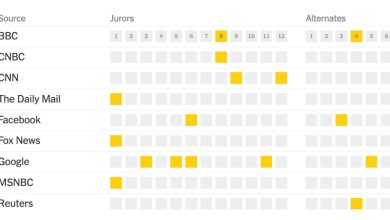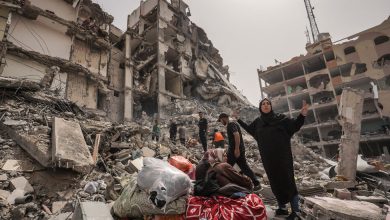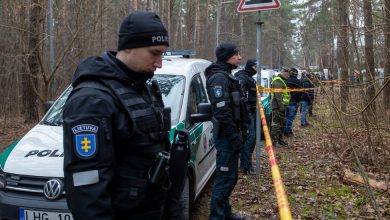In Munich, Young Directors Offer Horrors Both Real and Fantastical

MUNICH — At the end of a recent performance of “Bad Roads” here, the play’s Ukrainian director, Tamara Trunova, thanked the audience for staying for the entire 180-minute production, a harrowing succession of vignettes set in the Donbas region of eastern Ukraine, which Russia invaded in 2014, eight years before it undertook a larger war against Ukraine.
“It’s much easier to drink a glass of wine than it is to watch our play,” Trunova said from the stage of the Münchner Volkstheater, where “Bad Roads” opened this year’s Radikal Jung (Radical Young) festival, an annual showcase of productions by up-and-coming directors.
The two previously scheduled installments of Radikal Jung were canceled because of the pandemic. This year’s edition, which kicked off on June 26 and runs through this Saturday, is the first to be held in the Volkstheater’s brand-new home, a luxurious performing arts complex in a former slaughterhouse.
The festival is traditionally focused on theater from the German-speaking world, but this year’s lineup of 11 plays was unusually international. The widened geographical perspective seemed to acknowledge the artistic affinities between the work of young German theater makers and their counterparts in Greece, London and Paris. All but one of their productions were of recently written dramas, which seemed to reflect a desire to tell new stories that specifically address contemporary concerns. Many of today’s burning issues — including the pandemic, debates around gender and sexuality, the ubiquity of pop culture and social media, life during wartime and climate change — surfaced in Radikal Jung’s varied crop of productions.
In a strong lineup that also featured an innovative digital reworking of Goethe’s “The Sorrows of Young Werther” and a brilliantly acted one-woman show about Britney Spears, “Bad Roads” stood out — and not just for its torn-from-the-headlines immediacy.
The Ukrainian writer Natalya Vorozhbit based the play, subtitled “Six Stories About Love and War,” largely on reports she gathered while traveling across combat zones in eastern Ukraine. An earlier version of “Bad Roads” was staged, in English, at the Royal Court Theater in London in 2017; Trunova’s production premiered at the Left Bank Theater in Kyiv in 2019. (A film version directed by Vorozhbit was Ukraine’s official entry in the 2022 Academy Awards.)
On a stage dominated by a giant fence, a dozen actors vividly conjure Vorozhbit’s nightmarish tales. Hallucinogenic and frequently absurd, they alternate between the barbarically cruel and the banally quotidian. In the opening narrative, a journalist on a fact-finding mission in the Donbas needs to list her identifying body marks, such as moles and tattoos, on an application before entering the region, in case she is killed while on assignment.
The reporter, who in initiating us into the war zone seems to be a stand-in for the playwright, recites a lengthy monologue that combines the prosaic and the poetic. She tells us about the suffering she finds as well as the conflicted sexual attraction she feels toward the soldier who leads her around. “You aren’t just some ripped Brad Pitt look-alike,” she says. “You really have killed another person.”
This introductory story sets up the moral ambiguities of the tales that follow, in which ordinary people, robbed of their lives by a senseless conflict, are driven to extremes.
The production is relentlessly dark and savage, even if it’s shot through with morbid humor, such as the moment when a medic who is transporting her lover’s corpse propositions the soldier who has accompanied her on the mission: “A body without a head in a body bag just doesn’t turn me on.”
It was sometimes difficult, at least for this non-Russian- and non-Ukrainian-speaking viewer, to tell who was on which side. (The performance had German surtitles). The disorienting atmosphere brought to mind Sergei Loznitsa’s extraordinary film “Donbass,” another anthology of surreal episodes about the 2014 conflict. At the same time, Vorozhbit’s sensitivity to her characters’ psychologies — and her desire to understand the perspective even of violent perpetrators — make “Bad Roads” a deeply human work about the compromises, cunning and sheer blind luck that surviving in an inhuman time requires.
It was almost a relief to leave the real-life horrors of “Bad Roads” behind for the immersive dystopia of “Gymnasium,” a “high school opera” written and directed by Bonn Park with music by Ben Roessler. The only Volkstheater production at Radikal Jung, it is quite possibly the loopiest and most entertaining German production that premiered last year. Set in a kooky mash-up of the late Middle Ages and the 1990s, the show is a campy, riotous sendup of films like “Carrie,” “Heathers” and “Clueless” that gleefully pokes fun at American high school myths.
The stock characters and plot devices of teen comedies transposed to the eccentric setting provide Park and Roessler plenty of fuel for skewering our off-kilter world. Tribalism, feudalism and superstition are among the medieval codes that are resurgent in the “post-truth” digital age. With scrappily sung musical numbers and eye-poppingly colorful sets and costumes, “Gymnasium” comments on trolling, viral rumors and climate change skepticism with a gentle satirical touch.
The hand-drawn sets, the low-budget special effects — including an active volcano that looms over the school — and the rough and spirited playing of the Orchestra Academy of the Munich Philharmonic (credited as the Orchestra of Cheerleaders) help make “Gymnasium” the senior play you wish your school had been awesome enough — or your classmates talented enough — to put on.
While “Gymnasium” constructed its sui generis world from history and pop culture references, “We Are in the Army Now,” from the Greek director Elias Adam, plunged its audience into a largely digital theatrical universe to probe the hopes, anxieties and confusions of Gen Z.
First presented as part of an online theater festival put on by the Onassis Foundation-Stegi in Athens, this impossible-to-categorize show is a social media vaudeville where four fearless young performers bare their souls (and a lot of skin) while screaming into the cyber void.
While their tools of self-expression are TikTok and Instagram — and many parts of the live performances are captured with the performers’ smartphones or computers and projected at the back of the stage — their grievances are old as the hills: rage at their parents, unhappy loves, the impotence to change a world that refuses to accept them. Their autobiographical monologues, staged with furious energy and physicality, are alternatively heartbreaking and empowering. In an exuberant finale, the actors engage in some kick-ass cosplay, battling against the patriarchy and their own self-destructive tendencies as glam-rock Power Rangers.
Our world and the people in it need some serious sorting out. The innovative productions at Radikal Jung suggested that theater can help us untangle things, however modestly, by fostering a greater sense of solidarity with the victims of complex systems of oppression. As an actor in “We Are in the Army Now” says, “Ideology can’t be explained using emojis.”
Radikal Jung
Through Saturday at the Münchner Volkstheater; muenchner-volkstheater.de.




